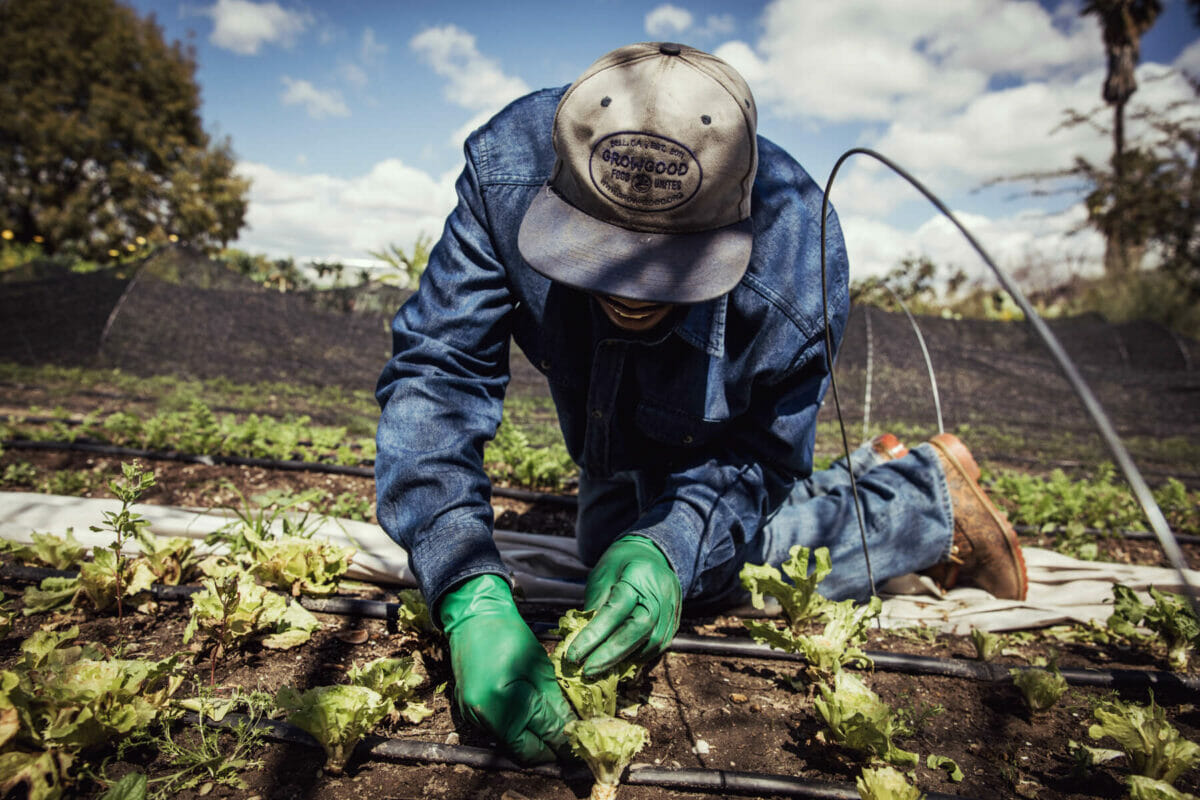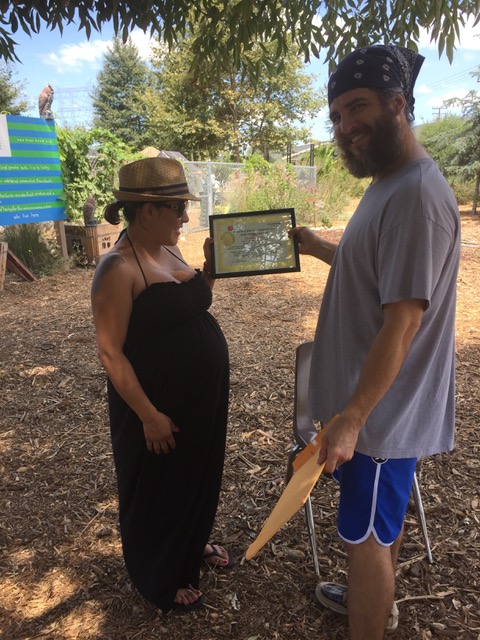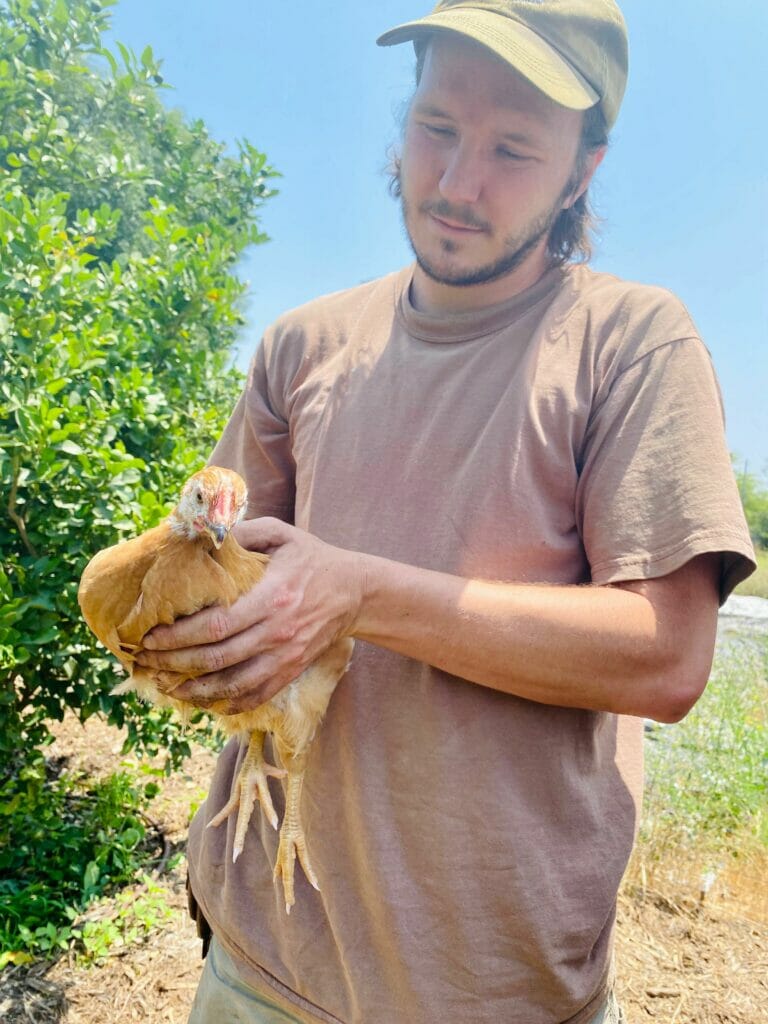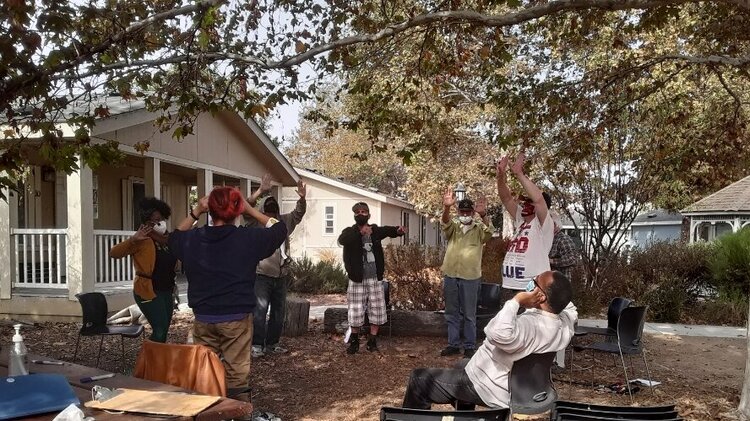This Urban Farm Is Small But Mighty
On a tiny patch of land east of Los Angeles, GrowGood is cultivating more than just fruits and vegetables.
This Urban Farm Is Small But Mighty
On a tiny patch of land east of Los Angeles, GrowGood is cultivating more than just fruits and vegetables.

Farm hands and volunteers have access to fresh vegetables, but also counseling and an addiction recovery program.photo courtesy of GrowGood Urban Farm.
On Dillon Toscano’s first day at GrowGood Urban Farm, located just 20 minutes southeast of downtown Los Angeles, he was put to work building chicken coops. The farm was expecting a delivery of baby chicks, which Toscano was excited about. “We got to see these chickens grow, and that was a whole understanding of farm life for me,” he says, reminiscing.
But as cute as those baby chicks were, covered in a downy white-blonde fuzz, they didn’t offset the amount of work required to build their coops and prepare for their arrival. “It’s not easy work, growing, plowing, it was very humbling,” says Toscano. “It was sweaty work.”
Still, Toscano came back, day after day, for nearly two years. He planted seeds and harvested their fruit. He raked, plowed, weeded and plucked until his shirts were soaked with sweat. He stood barefoot in the gardens, listening to the subtle sounds of the birds and insects and plants around him. Eventually, he started doing yoga in the garden and attending counseling sessions around a huge tree while sitting comfortably in its shade. He tuned in to the rhythms and energy of the sun rising and setting, finding peace as he walked among the plants.

GrowGood isn’t your average farm, and Toscano is not your average farm hand.
At GrowGood, located in Bell, California, farm hands and volunteers are all residents of the Salvation Army shelter across the street. About 30 feet from the gates of the 1.5-acre urban farm, the shelter houses hundreds of people, and it feeds them with food grown right outside their door. The farm offers counseling sessions in the garden, and the farm tries to introduce and tailor programs to what their residents want. That’s how Toscano found himself doing yoga and meditation in the middle of a lettuce patch—and loving it.
The small farm has 72 fruit trees planted, as well as a wide variety of produce. Salad greens are popular, along with peppers to snack on. Okra, corn, zucchini, cucumbers, eggplant, carrots and cherry tomatoes each have their own little areas. In the winter, the farm produces kale and collard greens, which grow next to pumpkin and squash patches. But even more impressive than the crops the farm grows is the impact they have on the people who harvest them.
“Even just taking the carrot out of the ground and washing it off [is impactful],” says farm manager Francis River. “[People] really appreciate those moments, because it’s kind of this special moment where some people have never pulled a carrot out of the ground and have been able to eat it.”
Something as simple as picking a peach or an orange from a tree can light a spark in visitors to the farm. “We have several people who really want to get into tree care, because they just have this experience where they’re harvesting straight from the tree,” says River.
For farm hands such as Toscano, the farm has provided a unique opportunity for healing. There, he learned a technique called grounding, where he makes physical contact with the earth below him. “At least two hours, minimum, a day,” Toscano advises. “That was the goal, and it really started helping with my recovery.”
Like many of the roughly 500 residents who live or attend programs at the shelter, Toscano found himself at the gates of GrowGood while trying to detox from years of drug addiction. Knowing that other paths to sobriety hadn’t worked for him, Toscano was an eager farm hand, wanting to “take advantage of everything” the farm had to offer, including an addiction recovery program.

That’s what farm manager River likes to hear. When volunteers from the shelter come to GrowGood, he’s excited to welcome them, teach them the basics of farm management and then watch as they find little pockets of transformation through plowing, planting and harvesting. One of the popular programs the farm offers is called Food For Life. “It basically guides participants through gentle yoga in the farm, as well as meditation, breathing exercises and a kind of an open discussion about where they are, expressing things that they’re going through,” River explains. “Part of the program is learning to handle anxiety and stress and all these traumas, while they’re also in this little wooded area, surrounded by native plants.”
It’s hard to believe that there could be an urban oasis in the middle of a concrete jungle, but River says the farm really does have a different energy to it. “You can sit down, and not see a telephone pole of a building, and you’re away from the road. You don’t see any cars. It’s a little hidden gem,” he says. “It’s just a safe space where we’re involved with nature and agriculture, but also building this trust and this kind of openness and vulnerability.”

In the future, River would love to expand the programs offered at the farm. He’s looked into bringing more meditation or yoga coaches on board to lead classes or having chefs host culinary and cooking classes with the fresh produce. During the COVID-19 pandemic, having a safe and open outdoor space has become even more important for River and the volunteer farm hands, and he wants to find ways to help them grow even further. “I would love to be able to get some funding to do more transitional employment programs, where we can actually pay people to work and build up their resume, so then they can help bridge the employment gap for them going forward,” River says. “There’s always projects I’m happy to find and do.”
Those opportunities certainly helped to change Toscano’s life. Since walking onto the GrowGood farm in 2015, he’s left the shelter and opened his own dog boarding and grooming business with his wife. He’s been sober for five years, and he credits much of that to lessons he learned at the farm.
“The way that I’ve been able to [maintain sobriety] is by keeping my program going, making sure I utilize all those things that I took from the farm,” he says.
Follow us
This work is licensed under a Creative Commons Attribution-NoDerivatives 4.0 International License.
Want to republish a Modern Farmer story?
We are happy for Modern Farmer stories to be shared, and encourage you to republish our articles for your audience. When doing so, we ask that you follow these guidelines:
Please credit us and our writers
For the author byline, please use “Author Name, Modern Farmer.” At the top of our stories, if on the web, please include this text and link: “This story was originally published by Modern Farmer.”
Please make sure to include a link back to either our home page or the article URL.
At the bottom of the story, please include the following text:
“Modern Farmer is a nonprofit initiative dedicated to raising awareness and catalyzing action at the intersection of food, agriculture, and society. Read more at <link>Modern Farmer</link>.”
Use our widget
We’d like to be able to track our stories, so we ask that if you republish our content, you do so using our widget (located on the left hand side of the article). The HTML code has a built-in tracker that tells us the data and domain where the story was published, as well as view counts.
Check the image requirements
It’s your responsibility to confirm you're licensed to republish images in our articles. Some images, such as those from commercial providers, don't allow their images to be republished without permission or payment. Copyright terms are generally listed in the image caption and attribution. You are welcome to omit our images or substitute with your own. Charts and interactive graphics follow the same rules.
Don’t change too much. Or, ask us first.
Articles must be republished in their entirety. It’s okay to change references to time (“today” to “yesterday”) or location (“Iowa City, IA” to “here”). But please keep everything else the same.
If you feel strongly that a more material edit needs to be made, get in touch with us at [email protected]. We’re happy to discuss it with the original author, but we must have prior approval for changes before publication.
Special cases
Extracts. You may run the first few lines or paragraphs of the article and then say: “Read the full article at Modern Farmer” with a link back to the original article.
Quotes. You may quote authors provided you include a link back to the article URL.
Translations. These require writer approval. To inquire about translation of a Modern Farmer article, contact us at [email protected]
Signed consent / copyright release forms. These are not required, provided you are following these guidelines.
Print. Articles can be republished in print under these same rules, with the exception that you do not need to include the links.
Tag us
When sharing the story on social media, please tag us using the following: - Twitter (@ModFarm) - Facebook (@ModernFarmerMedia) - Instagram (@modfarm)
Use our content respectfully
Modern Farmer is a nonprofit and as such we share our content for free and in good faith in order to reach new audiences. Respectfully,
No selling ads against our stories. It’s okay to put our stories on pages with ads.
Don’t republish our material wholesale, or automatically; you need to select stories to be republished individually.
You have no rights to sell, license, syndicate, or otherwise represent yourself as the authorized owner of our material to any third parties. This means that you cannot actively publish or submit our work for syndication to third party platforms or apps like Apple News or Google News. We understand that publishers cannot fully control when certain third parties automatically summarize or crawl content from publishers’ own sites.
Keep in touch
We want to hear from you if you love Modern Farmer content, have a collaboration idea, or anything else to share. As a nonprofit outlet, we work in service of our community and are always open to comments, feedback, and ideas. Contact us at [email protected].by Emily Baron Cadloff, Modern Farmer
October 3, 2021
Modern Farmer Weekly
Solutions Hub
Innovations, ideas and inspiration. Actionable solutions for a resilient food system.
ExploreExplore other topics
Share With Us
We want to hear from Modern Farmer readers who have thoughtful commentary, actionable solutions, or helpful ideas to share.
SubmitNecessary cookies are absolutely essential for the website to function properly. This category only includes cookies that ensures basic functionalities and security features of the website. These cookies do not store any personal information.
Any cookies that may not be particularly necessary for the website to function and are used specifically to collect user personal data via analytics, ads, other embedded contents are termed as non-necessary cookies.
My best to these people. May their project grow and help yet more people.
Hi, Emily. Hoping you & yours are safe & well. Thanks so much for reporting on GoodGrow. The whole country needs this kind of positive, local, personal action, but especially Los Angeles. Can you imagine 60,000 homeless in one city? And there are plenty of little vacant acre plots there that can become super-productive in human and vegital contentment. Thanks. rlgordonjr@hushmail.com
Sorry, I meant GrowGood, not GoodGrow
Thanks, cool story! Everything has its own tiny space: okra, maize, and cherry tomatoes. Kale and collard greens, which grow adjacent to pumpkin and squash fields, are harvested in the winter. However, the farm’s effect on the people who collect the crops is perhaps more remarkable than the crops themselves.
Thank you. I love this